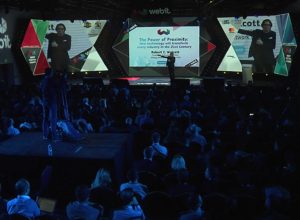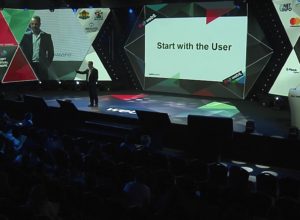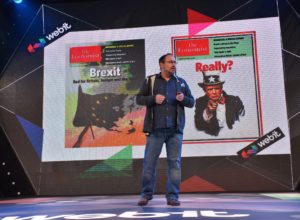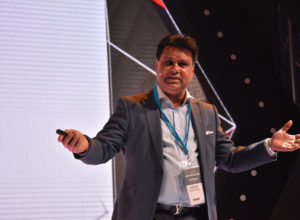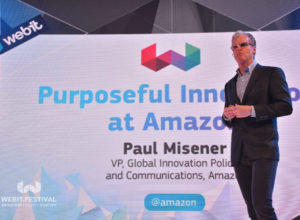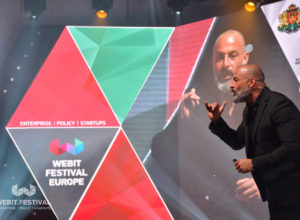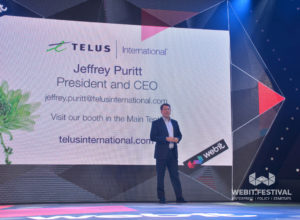Tag: webit.festival
How technology will transform every industry in the 21st century
In the next few decades we are going to witness an exponential change in the world of technology that is going to dramatically change every aspect of the way we live. But while many people are very concerned about the new technological trends coming, very few have noted one factor that they bring to the marketplace.
According to the Founder and Executive Director of Kellogg Innovation Network (KIN) Robert C. Wolcott each one of these trends push sensing, analytics and access to shared resources in more and more places in the economy and closer to us. That means that they push the production and provision of products and services ever closer to the moment at which they might be demanded.
The Professor of Innovation and Entrepreneurship was among the 300 top level speakers at this years Webit.Festival Europe. During his on stage presentation he shared some of his views about how technology will transform every industry in the 21st century.
In his work in KIN he looks for two things - strategy and implications of technology and change for large corporation. Wolcott is working hard to figure out where the world might be going and how to get there, while as an angel investor he is thinking about the future with respect to startups and emerging companies.
He pointed out Amazon as an example of company with vision about its future connection with the customers. For the past two years the retail giant is trying out something called anticipatory shipping. This means that they are watching your online behavior and send products to the distribution centers near you before you have even ordered the product.
[caption id="attachment_4993" align="aligncenter" width="640"]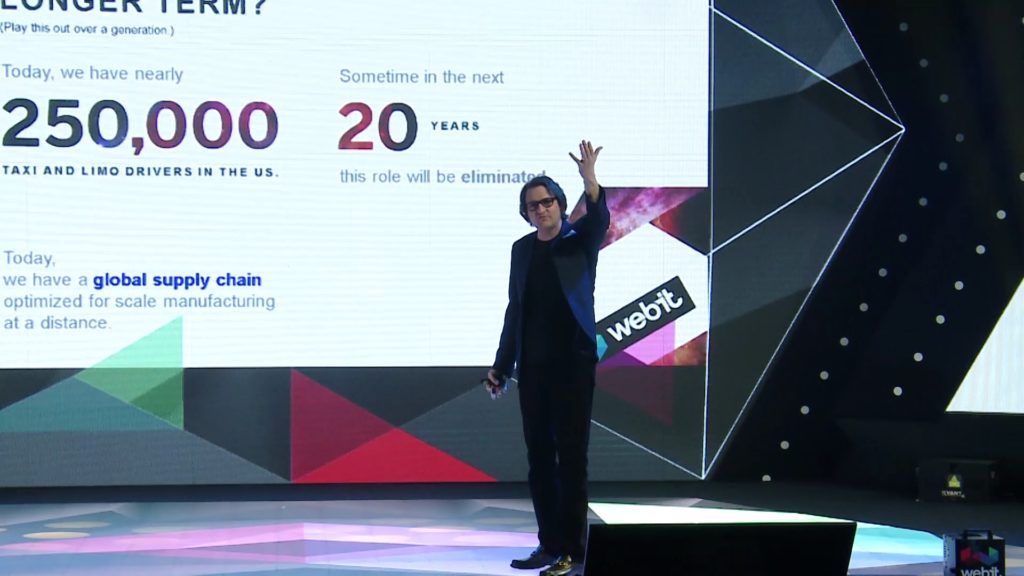 The Founder and Executive Director of Kellogg Innovation Network (KIN)[/caption]
Wolcott is sure that with the development of 3D printing will bring a real long-term revolution in the global supply chain of manufacturing. Things will start from the peripheries, because the biggest threats and opportunities never come in the middle of a market. The big players in different fields already know everything about their markets, but the disruptions often comes in small ways and emerge over time.
The Founder and Executive Director of Kellogg Innovation Network (KIN)[/caption]
Wolcott is sure that with the development of 3D printing will bring a real long-term revolution in the global supply chain of manufacturing. Things will start from the peripheries, because the biggest threats and opportunities never come in the middle of a market. The big players in different fields already know everything about their markets, but the disruptions often comes in small ways and emerge over time.
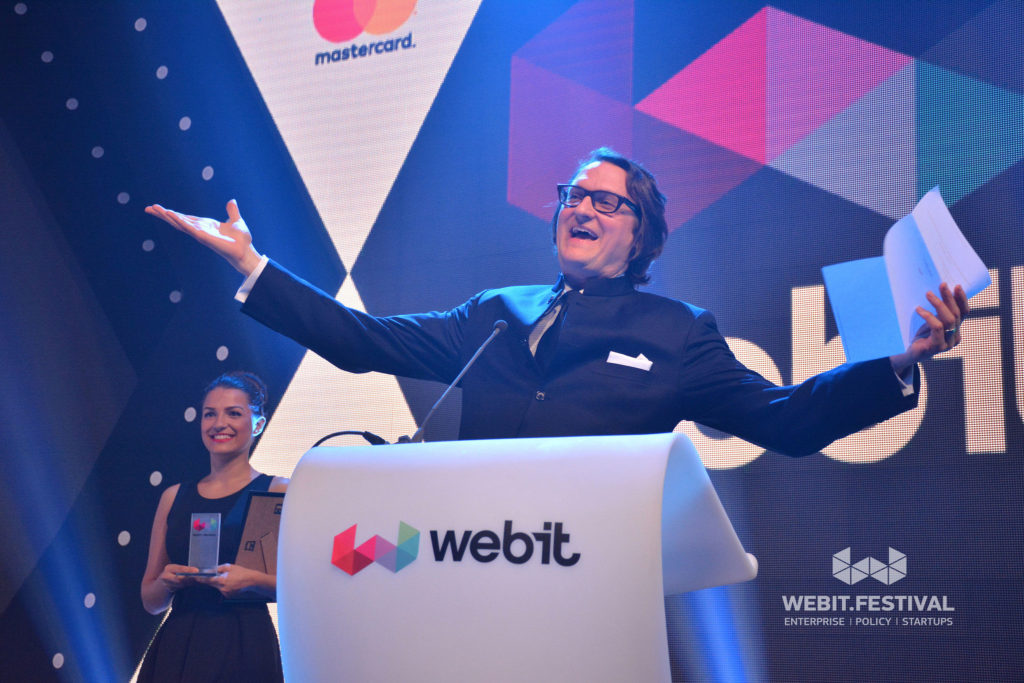 The Founder and Executive Director of Kellogg Innovation Network (KIN) presenting one of our Webit Awards.[/caption]
The technology is going to change even the metrics we use to measure the impact on the market. The normal family today usually needs at least two cars, but it may only need one vehicle in the future. For the entire history of the global automotive industry we have used unit sales as the one metric to show how successful a company is. All of the capital allocation, inventory management, marketing decisions and sales channels are focused around this metric.
According to the professor if we don’t recognize that soon it will not work in the same way as today, the tyranny of metrics will bring us down. Because we will continue to make decision based on performance metric that used to work and at some point of the future won’t work anymore. The solution is creating a portfolio of metrics to measure how things are going so that companies know how they are doing in advance of things changing.
The Founder and Executive Director of Kellogg Innovation Network (KIN) presenting one of our Webit Awards.[/caption]
The technology is going to change even the metrics we use to measure the impact on the market. The normal family today usually needs at least two cars, but it may only need one vehicle in the future. For the entire history of the global automotive industry we have used unit sales as the one metric to show how successful a company is. All of the capital allocation, inventory management, marketing decisions and sales channels are focused around this metric.
According to the professor if we don’t recognize that soon it will not work in the same way as today, the tyranny of metrics will bring us down. Because we will continue to make decision based on performance metric that used to work and at some point of the future won’t work anymore. The solution is creating a portfolio of metrics to measure how things are going so that companies know how they are doing in advance of things changing.
 The Founder and Executive Director of Kellogg Innovation Network (KIN)[/caption]
Wolcott is sure that with the development of 3D printing will bring a real long-term revolution in the global supply chain of manufacturing. Things will start from the peripheries, because the biggest threats and opportunities never come in the middle of a market. The big players in different fields already know everything about their markets, but the disruptions often comes in small ways and emerge over time.
The Founder and Executive Director of Kellogg Innovation Network (KIN)[/caption]
Wolcott is sure that with the development of 3D printing will bring a real long-term revolution in the global supply chain of manufacturing. Things will start from the peripheries, because the biggest threats and opportunities never come in the middle of a market. The big players in different fields already know everything about their markets, but the disruptions often comes in small ways and emerge over time.
“For instance today 20% of plastic auto replacement parts cost more to ship than they do to manufacture. Do you think at some point in the next decade people will start to produce auto plastic replacement parts through 3D printing closer and closer to the moment at which it is demanded in time and space”, he asked.The expert noted that last year there were 250 000 taxi and limo drivers in the US. But some time in the next 20 years all these jobs will be completely eliminated. This is a big concern both for governments and corporations, because we need an opportunity for everyone to evolve to transition to this new world. Today we have a global supply chain optimized for scale manufacturing at a distance. This means that the larger the manufacturing facility is, the lower the cost. In the next 30 or 40 years this equation will completely change and this will transform our economy fundamentally. During an interview with Mr. Wolcott at the Frankfurt auto show last year, the CEO of Peugeot-Citroen Carlos Tavarez said that just 5 years ago no one seriously paid attention to the idea of self-driving cars. Today every major player in the industry is trying to figure out how to catch up with disruptors like Tesla. He predicted that if the trend continues with this speed after 20 years we will not argue whether we should let autonomous cars on the road, but if we should let human drivers. And we can easily tell who is going to be the winner of this argument. [caption id="attachment_4991" align="aligncenter" width="640"]
 The Founder and Executive Director of Kellogg Innovation Network (KIN) presenting one of our Webit Awards.[/caption]
The technology is going to change even the metrics we use to measure the impact on the market. The normal family today usually needs at least two cars, but it may only need one vehicle in the future. For the entire history of the global automotive industry we have used unit sales as the one metric to show how successful a company is. All of the capital allocation, inventory management, marketing decisions and sales channels are focused around this metric.
According to the professor if we don’t recognize that soon it will not work in the same way as today, the tyranny of metrics will bring us down. Because we will continue to make decision based on performance metric that used to work and at some point of the future won’t work anymore. The solution is creating a portfolio of metrics to measure how things are going so that companies know how they are doing in advance of things changing.
The Founder and Executive Director of Kellogg Innovation Network (KIN) presenting one of our Webit Awards.[/caption]
The technology is going to change even the metrics we use to measure the impact on the market. The normal family today usually needs at least two cars, but it may only need one vehicle in the future. For the entire history of the global automotive industry we have used unit sales as the one metric to show how successful a company is. All of the capital allocation, inventory management, marketing decisions and sales channels are focused around this metric.
According to the professor if we don’t recognize that soon it will not work in the same way as today, the tyranny of metrics will bring us down. Because we will continue to make decision based on performance metric that used to work and at some point of the future won’t work anymore. The solution is creating a portfolio of metrics to measure how things are going so that companies know how they are doing in advance of things changing.
“There is a light at the end of the tunnel. If our vehicles in the future are driving around a lot more we will have what is called higher asset utilization. Which means we will need more replacement parts and services. And guess what automakers make a lot more money on then selling a car - replacement parts and service”, he said.Wolcott thinks that enterprises should start asking themselves what are the client needs they can prototype today that gets them in the game for the future. They should also try to identify technologies and business models that are happening on the periphery and might add tons of value, because the peripheral vision might turn out to be the biggest source of competitive advantage. He predicts that over the next 20 to 40 years across all industries everything will be shifting to push the production and provision of products and services ever closer to the moment at which they are demanded. So the questions we should be asking ourselves are what value are we providing, can we produce and provide our products and services at the moment they are demanded and if not will we still be relevant in the next 20 years. You may watch his full lecture here: If you want to keep up with the latest trend in the world of digital economy and technology, then Webit.Festival is the right place for you. Visit our website and book 2 of our Super Earlybird tickets for Webit.Festival Europe 2018 for just €100. Feel the Webit vibe with some of the best photos from this year’s event! [easingslider id="4954"]
The invisible intelligent infrastructure that will shape our future
Our near future presents before us amazing opportunities, driven by advancements in technologies for virtual and augmented reality, artificial intelligence and automation, scanning people’s minds and many more. But those incredible things are not going to become reality without an ever increasing number of computers, further development of cloud technologies and operation systems that are going to drive all these processes.
During this year’s Webit.Festival Europe our guests heard about some of the technologies that are going to change our everyday lives. But they also had the chance to listen to the Vice-President and CTO of VMware for EMEA region Joe Baguley explaining how the invisible intelligent infrastructure his company and its competitors are providing will enable us to build the future we want.
VMware is a member of the Dell Technology family of businesses. It is a global leader in cloud infrastructure and digital workspace technology. The company helps accelerating the digital transformation of its clients by enabling unprecedented freedom and flexibility in how they build and evolve IT environments.
While their work may remain unseen by the end customer the organizations working in this field are crucial for improving business agility by modernizing data centers and integrating public clouds, driving innovation with modern apps and safeguarding customer trust by transforming security.
During his keynote speech at Webit.Festival Joe Baguley said that many clients come to VMware talking about their digital transformation strategy and the things they want to do with their data centers and infrastructure.
 VMware’s Vice President and Chief Technology Officer for EMEA Joe Baguley.[/caption]
The digital transformation we see today is driven by 3 main factors - business agility and innovation, exceptional mobile experiences and protection of brand and customer trust. The priorities are to modernize data centers, integrate public clouds, empower digital workspaces and transform security.
Almost all projects that we can see in IT organizations today fell into one of these priorities. And all these priorities are going through a cycle. You analyze that there is a problem. Then you decide that the way to solve it is an app. Over time that app generates data about its users and their habits. You hopefully analyze that data to take advantage of it and update the application. That generates more data and the cycle goes again, while you are getting better and better app.
Usually this process takes about 12 to 18 months for most of the companies. But if they want to be like the leaders in the digital economy Google, Amazon, etc., they need to do this multiple times a day.
VMware’s Vice President and Chief Technology Officer for EMEA Joe Baguley.[/caption]
The digital transformation we see today is driven by 3 main factors - business agility and innovation, exceptional mobile experiences and protection of brand and customer trust. The priorities are to modernize data centers, integrate public clouds, empower digital workspaces and transform security.
Almost all projects that we can see in IT organizations today fell into one of these priorities. And all these priorities are going through a cycle. You analyze that there is a problem. Then you decide that the way to solve it is an app. Over time that app generates data about its users and their habits. You hopefully analyze that data to take advantage of it and update the application. That generates more data and the cycle goes again, while you are getting better and better app.
Usually this process takes about 12 to 18 months for most of the companies. But if they want to be like the leaders in the digital economy Google, Amazon, etc., they need to do this multiple times a day.
“My simple answer to them is that no digital transformation has ever started in the data center. No digital transformation ever started with a computer scientist. Digital transformation starts with the user and if there is one thing that enterprises need to learn and understand in the modern age is that they have never ever thought about their users, they have only ever thought about the business”, he added.The expert thinks that the key to successful digital transformation is understanding and focusing on who you actually sell to and why is he buying your product. In the world of B2B relationships the main goal behind buying an enterprise product is to solve your customers problems, so if you are a company like VMware you better think about the best ways to help your customers sell more to their customers. [caption id="attachment_4985" align="aligncenter" width="640"]
 VMware’s Vice President and Chief Technology Officer for EMEA Joe Baguley.[/caption]
The digital transformation we see today is driven by 3 main factors - business agility and innovation, exceptional mobile experiences and protection of brand and customer trust. The priorities are to modernize data centers, integrate public clouds, empower digital workspaces and transform security.
Almost all projects that we can see in IT organizations today fell into one of these priorities. And all these priorities are going through a cycle. You analyze that there is a problem. Then you decide that the way to solve it is an app. Over time that app generates data about its users and their habits. You hopefully analyze that data to take advantage of it and update the application. That generates more data and the cycle goes again, while you are getting better and better app.
Usually this process takes about 12 to 18 months for most of the companies. But if they want to be like the leaders in the digital economy Google, Amazon, etc., they need to do this multiple times a day.
VMware’s Vice President and Chief Technology Officer for EMEA Joe Baguley.[/caption]
The digital transformation we see today is driven by 3 main factors - business agility and innovation, exceptional mobile experiences and protection of brand and customer trust. The priorities are to modernize data centers, integrate public clouds, empower digital workspaces and transform security.
Almost all projects that we can see in IT organizations today fell into one of these priorities. And all these priorities are going through a cycle. You analyze that there is a problem. Then you decide that the way to solve it is an app. Over time that app generates data about its users and their habits. You hopefully analyze that data to take advantage of it and update the application. That generates more data and the cycle goes again, while you are getting better and better app.
Usually this process takes about 12 to 18 months for most of the companies. But if they want to be like the leaders in the digital economy Google, Amazon, etc., they need to do this multiple times a day.
“Most leading edge companies push different code to their production systems multiple times a day, minute or hour and not once in every 3 to 5 years. The reason you are behind is that you are not going around this loop quick enough. You do it faster, you win. Whether that is with your startup or your massive enterprise organization”, Baguley said.According to him, there are three things that stops companies from going around this loop - people, processes and technology. The aim of VMware is to help them with the last two of the factors with the development of invisible intelligent infrastructure that spreads data, entire applications and storage across multiple machines and multiple physical locations. The expert is sure that the rise of AI will bring a real revolution in the world of data management. The reason is that one of the large customers of his company operates over 350 000 virtual machines in a single cloud. If each one of them is creating 10 events per second that is 3.5 million events that need to be processed in that cloud. No human being in the world can understand and respond to 3.5 million machines to give you the idea of the health of that application and that infrastructure. The only way to make the machines this big to support the amazing stuff we hear about all day is to make the computer think about itself.
“Look around and think how can you help your organization and customers to get around this cycle quicker. Think about what is in the way between you and doing this and what can you do to get stuff out of the way. We are making sure technology is not in the way. We are making sure technology is so intelligent that is invisible intelligent infrastructure. It’s just there, it works, it thinks about itself”, Baguley said.You may watch his full lecture here: If you want to keep up with the latest trend in the world of digital economy and technology, then Webit.Festival is the right place for you. Visit our website and book 2 of our Super Earlybird tickets for Webit.Festival Europe 2018 for just €100. Feel the Webit vibe with some of the best photos from this year’s event! [easingslider id="4954"]
The fundamental issue of trust in technology and the ways to...
In an age of exponential advances in technologies, that soon seemed destined to remain part of the sci-fi movies, people around the world are having a hard time catching up with all the breakthroughs emerging from the IT industry.
As with everything new we face, there is fundamental issue of trust between customers and the tech innovators, trying to build a new digital world for all of us. There are numerous questions that the IT experts need to answer, before the public starts perceiving trends like the rise of AI and automation as something positive for the future.
Right now, most of us see the global tech giants collecting billions of data units from their users and doing whatever they want with them. But companies like Amazon and Facebook are now promoting customer obsession as the right way of doing business in the digital age and are leading the pack towards a more secure and trustworthy user interaction.
Among those responsible companies is Skyscanner - one of the largest online search engines for comparing prices of flights, hotels and cars for hire from all over the world. Its Founder and CEO Gareth Williams was among over 300 top level speakers at this year’s Webit.Festival Europe and explained to the guests of the event what are the best ways to start a digital business and to earn the trust of your customers.
He thinks that although the users still are not very interested in the ways big companies use their personal data, history will look back and judge them for the decisions they make today.
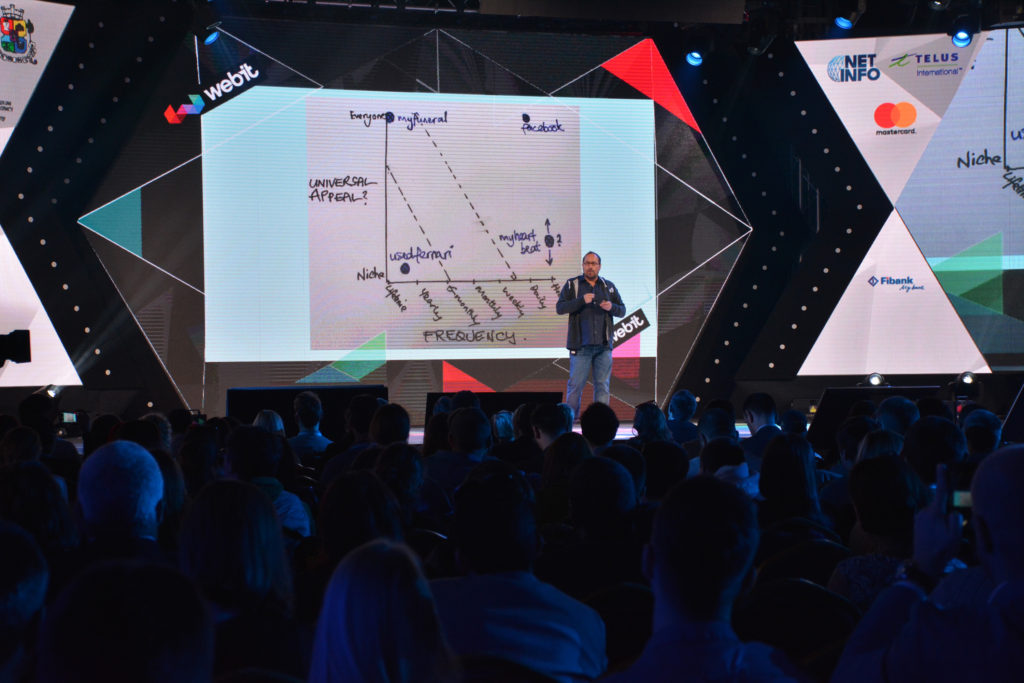 The Founder and CEO of Skyscanner Gareth Williams.[/caption]
According to Williams, the rise of information technology in the recent decades, combined with the constant growth in aviation demand created amazing business opportunities that people like him managed to use.
Recent survey by the International Air Transport Association (IATA) showed that aviation could be worth $88 billion to the world economy in 20 years. Part of the reason for that is the new regulation on private jets that Chinese authorities adopted last year.
Gareth Williams said that while entrepreneurship may be defined as the pursuit of opportunity without regard to resources currently controlled, the best definition for good management is quite the opposite - the pursuit of opportunity with complete regard to resources currently controlled.
He thinks that the key to building a successful company is the right combination between these two driving forces - spirit for entrepreneurship and managerial realism.
The Founder and CEO of Skyscanner Gareth Williams.[/caption]
According to Williams, the rise of information technology in the recent decades, combined with the constant growth in aviation demand created amazing business opportunities that people like him managed to use.
Recent survey by the International Air Transport Association (IATA) showed that aviation could be worth $88 billion to the world economy in 20 years. Part of the reason for that is the new regulation on private jets that Chinese authorities adopted last year.
Gareth Williams said that while entrepreneurship may be defined as the pursuit of opportunity without regard to resources currently controlled, the best definition for good management is quite the opposite - the pursuit of opportunity with complete regard to resources currently controlled.
He thinks that the key to building a successful company is the right combination between these two driving forces - spirit for entrepreneurship and managerial realism.
“It seems to me that there is a fundamental issue of trust and we have been packaged up as units of data. Right now, Wall Street brings global economic crashes. It is seen in a bad light by huge parts of the population and I’m wandering if we are heading in the same direction”, the entrepreneur said.Williams warned that now it is still legal to unite people as packages of data and do what you want with them, but noted that he is proud that when Skyscanner set up its goals, the leading aim was to become the most trusted and most used online travel brand in the world. Nearly 15 years after its launch, Skyscanner connects more than 60 million people every month directly to everything the travel industry has to offer. The company is also powering travel search for over 1200 partners through its Skyscanner for Business products. Talking about the impact of aviation, Williams quoted the English pioneer in this field Claude Grahame-White, who in 1914 predicted that the globe will be linked by flight and nations will become so knit together that they will grow to be next-door neighbours - something we can easily notice in Europe since the end of the World War II. “What railways have done for nations, airways will do for the world”, Claude Grahame-White said. [caption id="attachment_4979" align="aligncenter" width="640"]
 The Founder and CEO of Skyscanner Gareth Williams.[/caption]
According to Williams, the rise of information technology in the recent decades, combined with the constant growth in aviation demand created amazing business opportunities that people like him managed to use.
Recent survey by the International Air Transport Association (IATA) showed that aviation could be worth $88 billion to the world economy in 20 years. Part of the reason for that is the new regulation on private jets that Chinese authorities adopted last year.
Gareth Williams said that while entrepreneurship may be defined as the pursuit of opportunity without regard to resources currently controlled, the best definition for good management is quite the opposite - the pursuit of opportunity with complete regard to resources currently controlled.
He thinks that the key to building a successful company is the right combination between these two driving forces - spirit for entrepreneurship and managerial realism.
The Founder and CEO of Skyscanner Gareth Williams.[/caption]
According to Williams, the rise of information technology in the recent decades, combined with the constant growth in aviation demand created amazing business opportunities that people like him managed to use.
Recent survey by the International Air Transport Association (IATA) showed that aviation could be worth $88 billion to the world economy in 20 years. Part of the reason for that is the new regulation on private jets that Chinese authorities adopted last year.
Gareth Williams said that while entrepreneurship may be defined as the pursuit of opportunity without regard to resources currently controlled, the best definition for good management is quite the opposite - the pursuit of opportunity with complete regard to resources currently controlled.
He thinks that the key to building a successful company is the right combination between these two driving forces - spirit for entrepreneurship and managerial realism.
“Pretty much that is illustrated by the Skyscanner’s modest past from our early days starting with very basic website and zero funding for the first 5 years. And we kept on trying to get the balance right between that entrepreneurship and that management of the chaos. And we kept on doing it as we went along and so that each year we are modestly increasing the number of people who chose to come back to us”, the CEO said.Williams quoted the famous former CEO of Southwest Airlines Herb Kelleher, who once said that if the Wright brothers were alive today, Wilbur would have to fire Orville to reduce costs. While this may seem a little too harsh, the right cost management is among the key factors for the aviation industry - something that was showed 30 years ago by American Airlines. In 1987 the company managed to save $40 000 by eliminating one olive from each passenger’s salad plate. The expert suggested that the most important factor for making a successful digital business may be how frequently the user need your product or service. The Co-founder of Google and CEO of Alphabet Larry Page calls the process of determining this “The Toothbrush Test”. Before launching a product or service for the mass public, he ask himself if the average person would use it at least twice a day. Williams’s recipe for success in the digital world includes building a team with more product designers and engineers, rather than investing in the great profit extraction engines of the world like Google, Facebook etc. Then you need to go to something that is frequent enough to get the word of mouth and advertise itself. You may watch his full lecture here: If you want to keep up with the latest trend in the world of digital economy and technology, then Webit.Festival is the right place for you. Visit our website and book 2 of our Super Earlybird tickets for Webit.Festival Europe 2018 for just €100. Feel the Webit vibe with some of the best photos from this year’s event! [easingslider id="4954"]
Central and Eastern Europe is among the leading regions for innovation...
The major advances in digital and mobile technology in the recent years caused a real revolution in the finance and payments industry and are giving us a glimpse of a world without cash. And while development like this still seem too far away, we can still see big changes, both in terms of corporate strategies and consumers habits.
This year the guests at Webit.Festival Europe had the chance to listen to Mastercard’s Digital Payments Product Leader for Central and Eastern Europe Brian Morris sharing his views on the future of payments in the region and worldwide.
The scope of his work covers the development and implementation of new digital initiatives, the formation of partnerships with local industry players, digital platform management and expansion as well as the development of an Innovation strategy.
The expert explained that right now Mastercard has over 2.3 billion cards in circulation. The main goal of the company is to make them all digital, because almost all connected devices we have today can also work as payment devices.
As a major trend in the world of payments, Morris pointed out the increased enthusiasm for the use of biometrics, like fingerprints, iris scans and facial recognition technology.
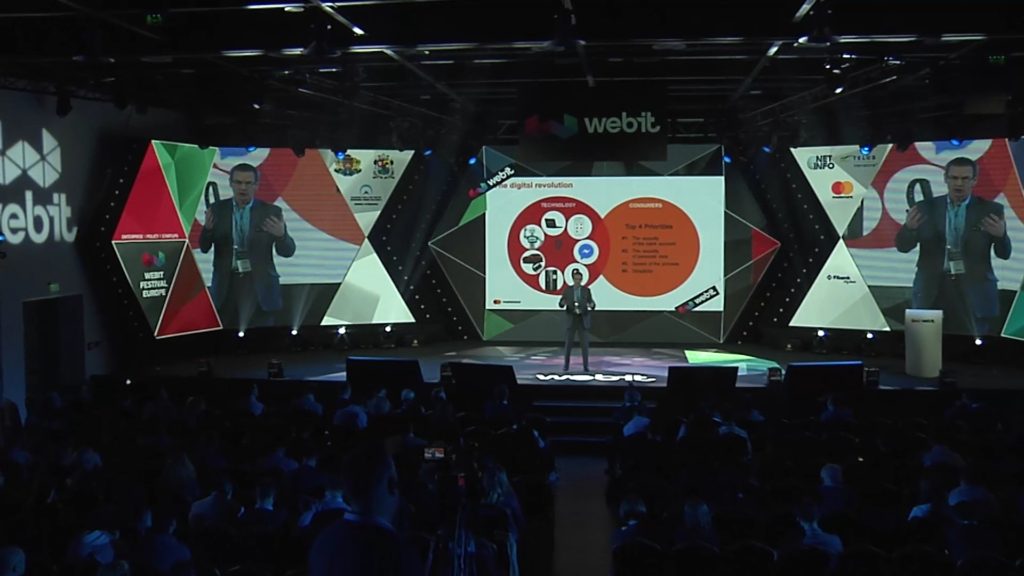 Mastercard's Digital Payments Product Lead for Central and Eastern Europe Brian Morris.[/caption]
According to Morris, the top 4 priorities for Mastercard in developing their new products and services are: the security of the bank account, the security of personal data, the speed of the process and the simplicity of the product or service itself.
If we want to put our cards into a lot of different devices we must know that our personal and banking information is secure. One thing Mastercard is doing is working on industry standards like tokenization. This means that the company is taking our data and encrypting it, so that it can be used only on the device it is stored on.
The speed is also a very important factor, because we currently live in society with no patience. If something does not happen very quick and easy, we don’t want to use it again. Simplicity in payments gives a huge added value for the customer, because this is something that we do every day. It must be simple, intuitive and easy to follow.
Morris noted that we are moving fast from a card-based society to contactless cards and that Bulgaria is among the leading markets for this in the region. But even the contactless technology is not the thing we all want. That is why Mastercard is building its fully digital environment for omni-channel reach.
Mastercard's Digital Payments Product Lead for Central and Eastern Europe Brian Morris.[/caption]
According to Morris, the top 4 priorities for Mastercard in developing their new products and services are: the security of the bank account, the security of personal data, the speed of the process and the simplicity of the product or service itself.
If we want to put our cards into a lot of different devices we must know that our personal and banking information is secure. One thing Mastercard is doing is working on industry standards like tokenization. This means that the company is taking our data and encrypting it, so that it can be used only on the device it is stored on.
The speed is also a very important factor, because we currently live in society with no patience. If something does not happen very quick and easy, we don’t want to use it again. Simplicity in payments gives a huge added value for the customer, because this is something that we do every day. It must be simple, intuitive and easy to follow.
Morris noted that we are moving fast from a card-based society to contactless cards and that Bulgaria is among the leading markets for this in the region. But even the contactless technology is not the thing we all want. That is why Mastercard is building its fully digital environment for omni-channel reach.
“These are all technology implementations and tech innovations. How the consumer feel is very important because all of you should understand that unless you start from the consumer and work back the way you will just have a nice technology that doesn’t do anything for people”, he said.Mastercard polls show that people around the world have positive feelings about innovation and the ability to use their payment cards on lots of different devices. 92% of consumers think that innovation has a positive impact on society. Around 50% of consumers are eager promoters or enthusiastic followers of digital payments. Brian Morris admitted that historically the banking and financial industry has not always looked straight at what the customer needs, but now this is becoming a much more important focus. The polls show also that the consumers prefered device for payments is now the mobile phone, while the digital customers prefer using their fingerprint more than a PIN code. Just a few years ago people didn’t want to use biometrics, because fingerprint scans were associated with criminals, police records and series of other negative factors. But now the advance of smartphones made people comfortable with using fingerprints to authenticate themselves and gives them a much better user experience. [caption id="attachment_4973" align="aligncenter" width="640"]
 Mastercard's Digital Payments Product Lead for Central and Eastern Europe Brian Morris.[/caption]
According to Morris, the top 4 priorities for Mastercard in developing their new products and services are: the security of the bank account, the security of personal data, the speed of the process and the simplicity of the product or service itself.
If we want to put our cards into a lot of different devices we must know that our personal and banking information is secure. One thing Mastercard is doing is working on industry standards like tokenization. This means that the company is taking our data and encrypting it, so that it can be used only on the device it is stored on.
The speed is also a very important factor, because we currently live in society with no patience. If something does not happen very quick and easy, we don’t want to use it again. Simplicity in payments gives a huge added value for the customer, because this is something that we do every day. It must be simple, intuitive and easy to follow.
Morris noted that we are moving fast from a card-based society to contactless cards and that Bulgaria is among the leading markets for this in the region. But even the contactless technology is not the thing we all want. That is why Mastercard is building its fully digital environment for omni-channel reach.
Mastercard's Digital Payments Product Lead for Central and Eastern Europe Brian Morris.[/caption]
According to Morris, the top 4 priorities for Mastercard in developing their new products and services are: the security of the bank account, the security of personal data, the speed of the process and the simplicity of the product or service itself.
If we want to put our cards into a lot of different devices we must know that our personal and banking information is secure. One thing Mastercard is doing is working on industry standards like tokenization. This means that the company is taking our data and encrypting it, so that it can be used only on the device it is stored on.
The speed is also a very important factor, because we currently live in society with no patience. If something does not happen very quick and easy, we don’t want to use it again. Simplicity in payments gives a huge added value for the customer, because this is something that we do every day. It must be simple, intuitive and easy to follow.
Morris noted that we are moving fast from a card-based society to contactless cards and that Bulgaria is among the leading markets for this in the region. But even the contactless technology is not the thing we all want. That is why Mastercard is building its fully digital environment for omni-channel reach.
“You are able to use your digitized card on your mobile phone, your connected fridge, on your fitness device, all fully protected and secured. And the key to that is how to make this happen on all these devices in a way which make sense. With innovation it is very easy to find lots of companies doing lots and lots of very exciting and very interesting things, but the key to making it truly successful is these three elements - security, convenience and scale”, he said.The scale means it can be adopted in many many markets across many different platforms and it is easily adapted. We see a lot of emerging innovations that does not have the scale capabilities. Central and Eastern Europe is a major innovation region for payments and according to Mastercard polls it is among the top regions in the world in terms of enthusiasm and adoption of innovation. People here want to see more digitalization in transport, health and education, but to enable all this we must first solve our payments problems. Morris thinks that the key to this is focusing on the entire ecosystem, including the big technology companies, FinTech innovators and startups and government institutions. That is why Mastercard is deploying its StartPath problems for emerging companies and is contributing to Smart Transport systems around the world using the contactless card as a main driver for adopting new payment technologies. You may watch his full lecture here: If you want to keep up with the latest trend in the world of digital economy and technology, then Webit.Festival is the right place for you. Visit our website and book 2 of our Super Earlybird tickets for Webit.Festival Europe 2018 for just €100. Feel the Webit vibe with some of the best photos from this year’s event! [easingslider id="4954"]
Technology will give us the tools to disrupt the dogma in...
We are living in amazing times, often described as the Fourth industrial revolution. Right now it is an incredible time to be involved in technology with its major impact and ability to empower people going forward into the future.
There are many aspects of our everyday life that are going to change dramatically due to the effect of the new technological advances, but healthcare is probably the field, that is going to be transformed the most.
The reason for that is that right now the healthcare systems around the world are inefficient, bureaucratic and expensive. This is a multitrillion-dollar industry which will be disrupted by thousands of startup companies, along with giants like Google, IBM, Apple, Samsung and dozens of others.
At Webit.Festival Europe our guests had the chance to listen to one of the innovators of this incredibly important field for the humanity and the first surgeon, who streamed live operation using Google Glass to 14 000 students across 132 countries - the Co-founder of Virtual Medics & Medical Realities Prof. Shafi Ahmed. During his opening keynote he spoke about the future of the surgical education around the globe and the best ways to disrupt a conservative industry, like healthcare.
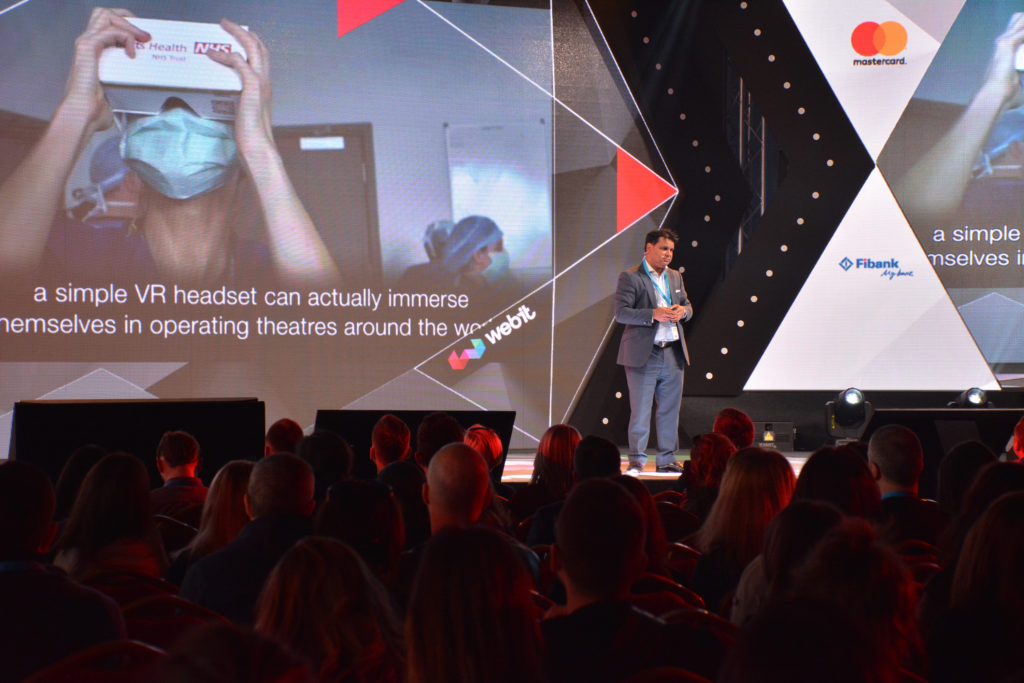 The Co-founder of Virtual Medics & Medical Realities Prof. Shafi Ahmed.[/caption]
In the new digital reality we need access to health services immediately and not waiting for appointments and the new technologies give us the tools to achieve that via Virtual and Augmented Reality and even commonly used software, such as Skype. Suddenly this is disrupting the pure doctor-patient relationship that we have all accepted for being the best.
And there is a lot more to come in the next few years. With avatars and facial recognition technology doctors can transport themselves in VR to other parts of the world and connect to patients there.
The Co-founder of Virtual Medics & Medical Realities Prof. Shafi Ahmed.[/caption]
In the new digital reality we need access to health services immediately and not waiting for appointments and the new technologies give us the tools to achieve that via Virtual and Augmented Reality and even commonly used software, such as Skype. Suddenly this is disrupting the pure doctor-patient relationship that we have all accepted for being the best.
And there is a lot more to come in the next few years. With avatars and facial recognition technology doctors can transport themselves in VR to other parts of the world and connect to patients there.
“Clinical practices are full of dogma and tradition but they want to change. I’m impressed by Bulgaria. You had amazing people here to begin with and all of this happening at Webit is quite a good enabler to think about how to change the world we live in. So please think about disrupting your minds and moving on to a world of exponential medicine”, he told the guests in the packed Blue hall.The famous surgeon is sure that we are approaching the age of singularity - a point at which the machines and computers will become better doctors and surgeons than humans. According to him the best way to facilitate this process is to stop being obsessed with the human touch and the human flavour of clinical practice. The reason for this is that we often visit a doctor for minor problems, like a cough or even a repeat prescription, that we can easily solve online. [caption id="attachment_4960" align="aligncenter" width="640"]
 The Co-founder of Virtual Medics & Medical Realities Prof. Shafi Ahmed.[/caption]
In the new digital reality we need access to health services immediately and not waiting for appointments and the new technologies give us the tools to achieve that via Virtual and Augmented Reality and even commonly used software, such as Skype. Suddenly this is disrupting the pure doctor-patient relationship that we have all accepted for being the best.
And there is a lot more to come in the next few years. With avatars and facial recognition technology doctors can transport themselves in VR to other parts of the world and connect to patients there.
The Co-founder of Virtual Medics & Medical Realities Prof. Shafi Ahmed.[/caption]
In the new digital reality we need access to health services immediately and not waiting for appointments and the new technologies give us the tools to achieve that via Virtual and Augmented Reality and even commonly used software, such as Skype. Suddenly this is disrupting the pure doctor-patient relationship that we have all accepted for being the best.
And there is a lot more to come in the next few years. With avatars and facial recognition technology doctors can transport themselves in VR to other parts of the world and connect to patients there.
“They call me a virtual surgeon, but I think we will be a lot more virtual in the future. We are now producing software technology that enable holoportation - visual transportation in VR. Imagine that you need some advice and a person from other parts of the world are transporting themselves to your operating theatre to help you”, Prof. Ahmed said.He thinks that democratizing the medical education is crucial for our future because today more than 5 billion people across the world don’t have access to safe surgery and this costs millions of lives every year. In Barts Medical School, where Shafi Ahmed is an Associate Dean, students are taught to use technology in different ways than the doctors working today. Part of this new agenda is the Barts X Medicine course where students can learn from venture capitalists, entrepreneurs, designers, developers, coders and people from the Silicon Valley. The school is organizing an annual hackaton and the team that wins receive crowdsourced funding for 3 months to create something substantial for patients care. This is a real disruption of education because in the near future we will need creative doctors, who can enable people, create designs, have innovative ideas and know the path from idea to its fruition. Prof. Ahmed pointed out Big Data, Genome Sequencing, AI and 3D Printing as the technologies that are going to bring the biggest changes in healthcare in the years to come. Meanwhile, the development of robotics will lead to automation of diagnostics and surgical procedures and in the long-term to replacing doctors with machines. You may watch Prof. Shafi Ahmed’s full lecture here: If you want to keep up with the latest trend in the world of digital economy and technology, then Webit.Festival is the right place for you. Visit our website and book 2 of our Super Earlybird tickets for Webit.Festival Europe 2018 for just €100. Feel the Webit vibe with some of the best photos from this year’s event! [easingslider id="4954"]
How to design the future we want to live in
No matter if we like it or not, we are going to spend the rest of our lives in the future. So we better sit down and talk about the best ways of designing the future we truly want to live in together.
And while “designing” the future may sound strange, the Chief Designer of SAP Martin Wezowski is sure that the ability to articulate and visualize our ideas will be among the most important skills in the years ahead.
During his long career Wezowski moved across a broad range of design disciplines from visual, interaction, usability, service to system design. Right now he is on a mission to map, build and inspire a brighter future for the generations to come. He was among the top speakers at Webit.Festival Europe and explained to our guest his vision of this process.
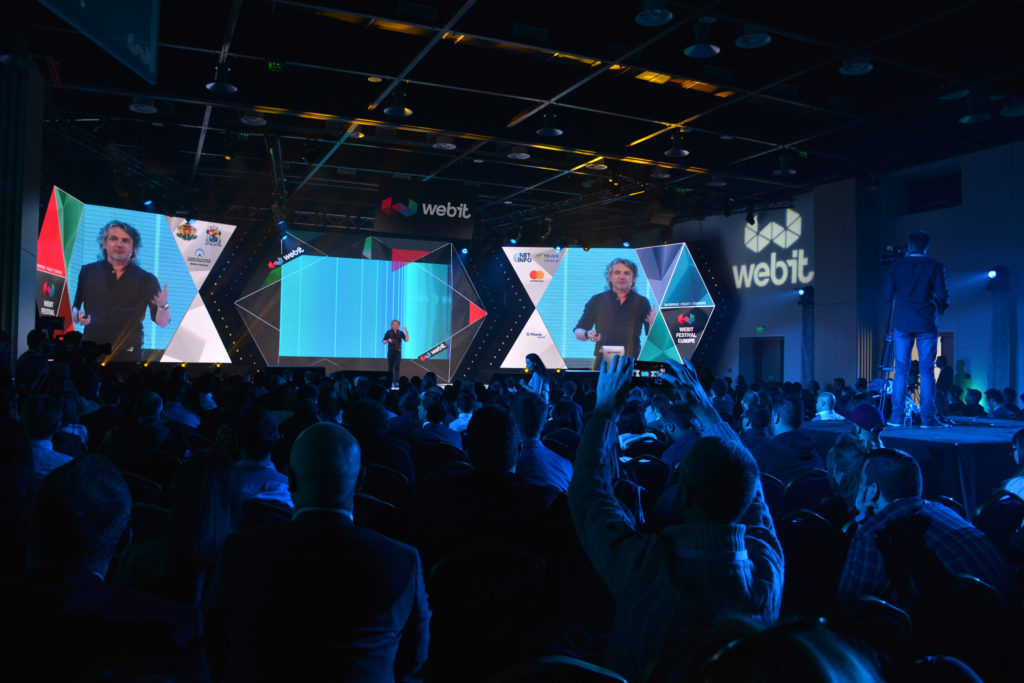 The Chief Designer of SAP Martin Wezowski[/caption]
In the next 1000 years our brains will not grow or develop that much, so that we can catch up with the exponential growth of technological capabilities. That is why our fast lane to evolution passes through symbiosis with machines.
This is already not a science fiction, because there are companies developing interface solutions for connecting our brain to a computer. There are paralyzed people controlling computers with their minds imagining they are moving.
Wezowski thinks that to build a better future we must use a method, called a human-centered design.
The Chief Designer of SAP Martin Wezowski[/caption]
In the next 1000 years our brains will not grow or develop that much, so that we can catch up with the exponential growth of technological capabilities. That is why our fast lane to evolution passes through symbiosis with machines.
This is already not a science fiction, because there are companies developing interface solutions for connecting our brain to a computer. There are paralyzed people controlling computers with their minds imagining they are moving.
Wezowski thinks that to build a better future we must use a method, called a human-centered design.
 Wezowski advised Webit’s guests to try and design the relationships they want to have with their customers and then to start building products and services around their needs, because “content may be the king of digital, but context is the King Kong”.
The business is designing products and services. These services shape our behavior, like the smartphones changed our everyday lives. Our behaviours shape our communities and discussions. Communities shape our societies and they are shaping the course of politics. So the design have serious reflection on the political life.
SAP’s Chief Designer predicted that in a decade somewhere in Europe we will have a minister, that is not only a clever mathematician, but an expert with strong design and innovation background, because this will be some of the most important factors for shaping our politics in the near future.
Wezowski advised Webit’s guests to try and design the relationships they want to have with their customers and then to start building products and services around their needs, because “content may be the king of digital, but context is the King Kong”.
The business is designing products and services. These services shape our behavior, like the smartphones changed our everyday lives. Our behaviours shape our communities and discussions. Communities shape our societies and they are shaping the course of politics. So the design have serious reflection on the political life.
SAP’s Chief Designer predicted that in a decade somewhere in Europe we will have a minister, that is not only a clever mathematician, but an expert with strong design and innovation background, because this will be some of the most important factors for shaping our politics in the near future.
“The changes in our lives are happening faster and faster and are becoming a flow and a platform for you to utilize as you want. But it is also a platform of fear. Everything we change and everything we see as something that we do not recognize is something we think is dangerous”, he said.This is why the designer thinks that we must have a greater conversation about the processes that are happening today and the best ways of managing them. According to him the problem often is that people are not thinking about the future in a coherent ecosystemic way. [caption id="attachment_4963" align="aligncenter" width="640"]
 The Chief Designer of SAP Martin Wezowski[/caption]
In the next 1000 years our brains will not grow or develop that much, so that we can catch up with the exponential growth of technological capabilities. That is why our fast lane to evolution passes through symbiosis with machines.
This is already not a science fiction, because there are companies developing interface solutions for connecting our brain to a computer. There are paralyzed people controlling computers with their minds imagining they are moving.
Wezowski thinks that to build a better future we must use a method, called a human-centered design.
The Chief Designer of SAP Martin Wezowski[/caption]
In the next 1000 years our brains will not grow or develop that much, so that we can catch up with the exponential growth of technological capabilities. That is why our fast lane to evolution passes through symbiosis with machines.
This is already not a science fiction, because there are companies developing interface solutions for connecting our brain to a computer. There are paralyzed people controlling computers with their minds imagining they are moving.
Wezowski thinks that to build a better future we must use a method, called a human-centered design.
“Change is our innovation pipeline. Change, if you study it deeply, is you design brief. And it comes in systems. Once you have electric cars, to change the game globally you need an infrastructure. You need to articulate it and make a picture. It helps, because people already want it when they see it”, he said.The expert is sure that we need a culture and conversation beyond the economy, society, ethics and politics that we have today. He thinks that there is a growing need to understand the needs of people, even if they still don’t understand them. He gave an example with SAP, that is regarded as one of the most emphatic companies in the world, together with Netflix, Microsoft, Google and Facebook. Empathy is a very good tool to design the things that people actually need in their lives. It is a good tool for innovation. Good design is good business. High empathy and high performance go together, increasing value and market capitalization. This is what empathy gives you the ability to understand human beings and your customers.
 Wezowski advised Webit’s guests to try and design the relationships they want to have with their customers and then to start building products and services around their needs, because “content may be the king of digital, but context is the King Kong”.
The business is designing products and services. These services shape our behavior, like the smartphones changed our everyday lives. Our behaviours shape our communities and discussions. Communities shape our societies and they are shaping the course of politics. So the design have serious reflection on the political life.
SAP’s Chief Designer predicted that in a decade somewhere in Europe we will have a minister, that is not only a clever mathematician, but an expert with strong design and innovation background, because this will be some of the most important factors for shaping our politics in the near future.
Wezowski advised Webit’s guests to try and design the relationships they want to have with their customers and then to start building products and services around their needs, because “content may be the king of digital, but context is the King Kong”.
The business is designing products and services. These services shape our behavior, like the smartphones changed our everyday lives. Our behaviours shape our communities and discussions. Communities shape our societies and they are shaping the course of politics. So the design have serious reflection on the political life.
SAP’s Chief Designer predicted that in a decade somewhere in Europe we will have a minister, that is not only a clever mathematician, but an expert with strong design and innovation background, because this will be some of the most important factors for shaping our politics in the near future.
“Tim Brown from Ideo said that design is too important to be left only to designers. This is very very true because design and innovation is the same thing. The future is too important to be left to any of us. This is where need to get in one room and start this conversation. We have seen the exponential speed of change and we are able to do this. We have these conversations, but we need to spread them across the globe. And I think that if we can do it really really right we can build a future we want to live in. I was thinking we could start today”, he said.Soon you will be able to see Martin Wezowski’s full presentation on our YouTube channel. If you want to keep up with the latest trend in the world of digital economy and technology, then Webit.Festival is the right place for you. Visit our website and book 2 of our Super Earlybird tickets for Webit.Festival Europe 2018 for just €100. Feel the Webit vibe with some of the best photos from this year’s event! [easingslider id="4954"]
To innovate you have to be willing to experiment and fail
The ability of offering long-term innovation to the customers is the main factor, that is dividing the companies of the 20th century from the ones that are emerging with the development of the Fourth Industrial Revolution.
Right now we are living in a world that is changing so fast, that even the biggest players of the corporate world are having a hard time catching up with the trends. But there are some that follow, and some that are setting the tone, both for customers and enterprises.
Certainly one of the best examples in this regard is Amazon - the fourth highest valued company in the world that has notorious obsession with its customers. At this year’s Webit.Festival Europe we had the chance to listen to the company’s Vice President for Global Innovation Policy and Communication Paul Misener.
The famous expert spoke about the 3 leading innovation principles in Amazon - the Customer obsession, Long-term thinking and Passion for Invention.
He gave the Bulgarian-American scientist John Atanasoff as an example of 20th century inventor, who managed to create the world’s first digital electronic computer. On the contrary he pointed out a 24 pages long research paper, published by CERN couple of years ago, that had over 5000 co-authors.
“Somewhere in the past century we have gone from the lone innovator all the way to 5000 working on a particular innovation”, Misener said.According to him one of the reasons for Amazon’s success is the ability to foster innovation with “Two-pizza teams”. The concept is that any new innovation or problem that needs to be solved should be solved using a group of individuals that can be fed comfortably with two large pizzas. It means that there is a number of people between 4 and 12 who can effectively work together as an innovation team. With larger teams it turns out that there are difficulties with communication between team members. With smaller it turns out that you are not getting enough talent in the mix. The idea here is clear, you want enough individuals to make a difference but at the same time you don’t want too many, because the communication between them becomes impossible. Paul Misener said that within the context of innovation Amazon uses the Working backwards doctrine. When the company has a plan to have a new product or service, the team sets time to see it on the market and starts looking backwards to the present day to figure out what it needs to do to get to that point. The second guiding principle is the ability to Engage in long-term thinking. This process ignores the short-term hurdles, but it also speaks to a willingness to be misunderstood by others who may not share the long-term vision. As examples for that Mr. Misener showed the audience several Amazon project that have failed the expectations and were shut down. But there are more than one successful initiative, like the idea to let third-party sellers to market their products on the company’s website and introducing customer reviews to the products.
“When we first introduced this our investors and partners said that this is crazy, because we are trying to sell things and in the same time we are allowing customers to come to our territory and criticize the things we are selling. We have lost a lot of short-term sales because of this, but we have built a long-term trust in our company”, he said.The third leading principle in Amazon is the Passion for invention and the notion of experimenting and being willing to fail in the process. The ability to take risks is a crucial part of innovation, because if you know what the outcome of your experiment is going to be, than it is not experimenting. An actual experiment has to be able to fail. And to innovate and introduce new things to the customers, you have to be willing to try them out. Soon you will be able to see Paul Misener’s full presentation on our YouTube channel. If you want to keep up with the latest trend in the world of digital economy and technology, then Webit.Festival is the right place for you. Visit our website and book 2 of our Super Earlybird tickets for Webit.Festival Europe 2018 for just €100.
The key to innovation is having an open mind and desire...
The concept of Digital Single Market that covers digital marketing, e-commerce and telecommunication sectors in Europe was officially presented by the European Commission in May 2015 and was pre-announced on the stage of Webit’s CEEDS in April 2015.
The Vice President of the Commission Andrus Ansip explained that the realization of the project could contribute €415 billion per year to the common EU economy and create hundreds of thousands of new jobs.
More than two years after its announcement the Digital Single Market is still looks more like a great idea than а reality. And according to the famous marketing strategist and trendwatcher for Fortune 500 companies Igor Beuker this could be the greatest chance that Europe have, if it wants to catch up with the competition of economic juggernauts like USA and China.
On the stage of Webit.Festival Europe he shared his Math Man view on why intelligence is the ability to adapt to change. This skill is increasingly important in the corporate world, struggling with the process of digital transformation.
During his keynote speech at the Opening ceremony he showed the audience the latest trends in the digital economy and presented his thoughts on the current systems, that were developed for the 20th century.
He explained that Digital Darwinism is the phenomenon in which trends, technologies, consumers and society evolve faster than established brands can adapt. It’s a fate that also threatens governments, institutions, and all other corporate organizations. Today, tomorrow and in the unforeseeable future.
“For almost 25 years I am witnessing that advertising may win quarters, innovation wins decades. I don’t need to know much about technology, I’ve just got an open and limitless mind. I’ve learned that i.e. our financial, political and educational systems were built for the 20th century. It’s about time we seriously upgrade these systems, so we can finally deal with the challenges and opportunities of this 21st century”, said Mr. Beuker.According to Beuker, the traditional corporate world is ruled by “Mad Men”, who keep spending billions of dollars on advertising, backward-looking market research and consultancy services, but fail to innovate. That’s why Mad Men are losing the war from the Math Men. The exponential growing disruptors, who all have a trend-driven, opportunity-seizing innovation culture. He gave examples of Blockbuster, Kodak, Nokia and many other heritage brands, who neglected trends forever, but kept spending billions of dollars on advertising, IBM consultants, old school R&D, and backward-looking market research. Still they lost. The lifespan for Fortune 500s is declining at a pace we’ve never seen before in history. A serious wake-up call. On the other side we see exponential growing companies like Amazon, Tesla, Facebook, Google, Airbnb who are spending billions of dollars per year on trend-driven innovation, not on advertising.
“Amazon spends $13 billion per year on innovation, Walmart and Target each spend $2 billion per year on innovation. Incumbent brands are all addicted to advertising, and miserably fail at innovation. The reason is not technology, because we all have access to the same technologies. The problem with Mad Men is their DNA, mentality and mindset. They’d rather wait 4 more years on relevant business cases. While Math Men are the business case”, Beuker stated.The expert thinks that the main problem with the big brands is their “buy not make mentality” - they are trying to acquire innovators, instead of innovating themselves. Beuker is sure that if the corporations don’t start to effectively innovate, they may no longer exist in 5 to 7 years. The biggest advantage is the fury of the founders of the new digital giants, like Amazon, Tesla and Alibaba. Math Man like Jack Ma has a purpose in life. In 20 years, he wants to grow Alibaba from 500 million to 2 billion customers worldwide, make 10 million retailers profitable and create 100 million news jobs. The Math Men generation entrepreneurs will have a much bigger impact on our global economy than politicians, who have no clue about the digital economy or how to deal with robotization and jobs.
“Digital single Europe is so important because we need startups and unicorns. They will provide new jobs, will create growth, will increase Europe’s GDP and will support our digital markets. We don’t have Facebook, Google, Airbnb and others, but we would like to have them. Politics and the EU need to facilitate businesses much better. Banning Uber is an ignorant way to block innovation”, said Beuker.Soon you will be able to see his full presentation on our YouTube channel. If you want to keep up with the latest trend in the world of digital economy and technology, then Webit.Festival is the right place for you. Visit our website and book 2 of our Super Earlybird tickets for Webit.Festival Europe 2018 for just €100.
In customer service robots are going to assist humans, not replace...
In the information age we live in, keeping your business in a very close relationship with its customers or clients the most important premise for success. And if you don’t believe in this way of doing business, you better start to, because it is one of the driving forces that fueled the expansion of a company, valued at more than $1 billion.
The President and CEO of TELUS International Jeffrey Puritt was among the top speakers at this year’s Webit.Festival Europe - the premier digital and tech festival in the region. His opening keynote gave our guests a glimpse in the management processes in a global company with more than 25 000 employees and its communication with the customers.
On April 25-26 the event gathered in Sofia more than 5100 attendees coming from over 90 countries. Among them were policy makers, innovators, entrepreneurs, investors, scientists and experts fascinated by technology and fostering the digital transformation in the business and the society.
For the last 15 months the management of TELUS increased the customer satisfaction from 74% to nearly 91%, while the clients of the company registered increased profitability and revenues.
According to Mr. Puritt, the main reason for this is a world class customer service and a corporate culture, that engages and inspires all the team members of the company.
In an age of automation and upcoming AI revolution, TELUS is investing in its employees while continuing to embrace the latest high-tech approaches to the customer service. The CEO is sure that in this specific field, the future of AI is focused on supporting, not replacing humans. And the reason for this is that there are many things we can do better than machines.
Jeffrey Puritt said that when society progresses we often turn to technology over a human touch. But replacing human interaction, such as live agents, with chatbots and computer programs gives the consumer the feeling of losing touch with the company.
“Technology is making increasingly hard for brands to keep this important connection with consumers. A recent study found that 83% of consumers prefer dealing with human beings over digital channels when it comes to solving their issues. We need to become more thoughtful and deliberate in the way we are using technology”, he suggests.Right now the AI systems still have their limitations. Machine learning requires huge volumes of past data, while humans don’t. A recent study showed that despite of the automation processes that are going on, the number of support agents worldwide will increase with between 10% and 50% by 2020.
“Not only will we need new agents, but a higher skilled agents who can solve more complex customer problems. More than ever now the customer service agents are the key to providing a world class brand experience”, Puritt said.As the science of the customer experience continues to evolve with new technology the need to provide a high-touch experience to truly win the hearts and minds of consumer grows. But the foundation for this is building an exceptional employee experience. In his opening keynote Jeffrey Puritt spoke about several other topics, such as using omnichannel approach for building customer loyalty and better connection with clients and reaping the benefits of Big Data analytics for creating a better customer experience. Soon you will be able to see his full presentation on our YouTube channel. If you want to keep up with the latest trend in the world of digital economy and technology, then Webit.Festival is the right place for you. Visit our website and book 2 of our Super Earlybird tickets for Webit.Festival Europe 2018 for just €100.
